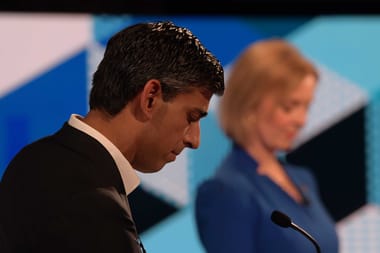
Press play to listen to this article
Voiced by Amazon Polly
BERLIN — Christian Lindner always knew being Germany’s finance minister would not earn him “much applause.” He didn’t even want such adulation, he claimed, aware he wasn't “applying for a place in the hammock.”
How right he was.
Only seven months into the job, Lindner, the charismatic 43-year-old leader of the fiscally conservative Free Democratic Party (FDP), has had to repeatedly contravene his campaign pitch: Vote for us, and we’ll reduce spending from within a left-leaning coalition government.
In fact, instead of reinstating Germany’s debt rules, Lindner has overseen a record buildup of debt since entering the government.
His promise was, of course, made before war returned to Europe, before an energy crisis gripped the Continent, before runaway inflation and before panicked whispers of a looming recession in the wake of a pandemic. And the €240 billion in debt Germany has amassed under Lindner went to address those crises, boosting a chronically underfunded military and cushioning companies and citizens from economic woes.
“Things were not predictable,” Lindner told parliament in late spring, defending his decisions amid heavy criticism from the conservative opposition, which has already branded him as Germany's "king of debt."
Yet things now seem slightly more predictable. And it doesn’t look good for Lindner and the FDP.
Russia on Thursday resumed only limited deliveries of gas to Germany, forcing the government to announce emergency plans amid fears of a broader recession. That means more pressure on Lindner and the government to financially shield households and businesses: Economy Minister Robert Habeck said Thursday that “most people in the federal government” backed further support measures for citizens in the case of rising energy prices.
That would likely mean the death of Lindner’s latest pledge: To return to fiscal restraint — the so-called Schuldenbremse, or "debt brake" — by next year. Leaders from German Chancellor Olaf Scholz's party are already dismissing such a return.
The end result could be a further slide for the FDP, which was rising in the polls only a year ago before falling back of late. Already, the party has suffered two painful defeats in recent state elections, forcing it into opposition in both places.
"So far Lindner hasn't been able to deliver much on his electoral promises,” said Uwe Jun, a political science professor from Trier University. “The FDP is in quite a downward trend because many people who voted for it [last year] don't find themselves represented in the current government policies.”
On the descent
For the FDP, the two state-level losses were a shock — especially in North Rhine-Westphalia, Germany's most populous state and Lindner's home turf, where the party lost nearly half its support from the last election, dropping to 5.9 percent.
That humiliating defeat evoked a decade-old tumble, when the FDP cratered in the 2013 general election after joining a federal governing coalition in 2009 and failing to enact several election promises. In the end, the party failed to even clear the 5 percent hurdle needed to get seats in Germany's parliament, the Bundestag.
Now, there are fears within the FDP that the recent elections are a warning sign that history might be repeating itself.
GERMANY NATIONAL PARLIAMENT ELECTION POLL OF POLLS
For more polling data from across Europe visit POLITICO Poll of Polls.
The polls are fueling those fears. After scoring 11.5 percent in last year's general election, the pro-business FDP is now polling between 6 and 8 percent. Meanwhile, one of their left-leaning governing partners, the Greens, has jumped from 14.8 percent to over 20 percent in the polls. And the Social Democrats (SDP) are hovering around 20 percent, despite Scholz's criticized hesitancy over proving Ukraine with advanced weapons.
Lindner saw these problems coming even before joining the coalition. He never tired during the campaign of noting how "very far apart" his FDP was from the Greens and SPD on key issues.
Still, Lindner found himself in a kingmaker role after the election, with the SPD and Greens needing the FDP to form a coalition. And Lindner was under pressure to not pass up a powerful government role after rejecting an offer to govern in 2017, concerned the FDP would not be able to fulfill its electoral promises as a junior partner.
"Minister Lindner has always made it clear that he would only enter into a coalition with the FDP that respected the debt brake, refrained from tax increases and scaled back expansionary fiscal policy overall," said an official from Lindner's finance ministry.
Lindner's control of the finance ministry "is central to being able to keep these promises to the voters," the official added, referring to the more generous spending behavior of the FDP’s two left-leaning coalition partners.
Lindner did not provide a direct comment for this article.
Less visibility
Part of the FDP's problem is that it chose government portfolios with little visibility in the current international crisis. Besides finances, the party got three other ministries: justice, digital and transport policy, as well as education and research.
Many FDP liberals look with envy at the Greens, which lead the foreign ministry and economy ministry, both central to the war and energy crisis.
"When the coalition was negotiated, none of us could have imagined what was to come," said Marie-Agnes Strack-Zimmermann, a senior FDP lawmaker who chairs the Bundestag's defense committee.
Tellingly, because she is working on defense issues, Strack-Zimmermann has received more attention in recent months than some of her FDP colleagues running ministries. She's used that perch to regularly press Scholz to increase military support for Ukraine.

"If we had been able to have a fifth ministry, it would have been of course clear that we would also have gone into the international sphere," Strack-Zimmermann said. "But it didn't happen that way."
Strack-Zimmermann argued that in the longer term, the FDP's oversight of issues like digitalization and education will attract more attention. The party has also started touting its work to adopt a popular program to reduce public transport costs amid high fuel prices. Lindner on Tuesday even offered to increase a rebate scheme allowing commuters to deduct travel costs from their taxable income.
Crucially, Scholz himself is aware the FDP urgently needs a win to reassure the party it's benefitting from being in the government coalition, according to several people familiar with Scholz's thinking. Scholz, they add, wants to minimize the risk that Lindner could pull the plug on the coalition deal.
Victory needed
So far, the biggest FDP achievement in government has been winning an internal tug-of-war over how fast Germany should lift its coronavirus restrictions, convincing the government to shift to fewer state interventions and more individual responsibility.
And the party may have some small wins on the horizon.
The government this week cautiously moved toward potentially extending the life of Germany's nuclear power plants given concerns over a gas cutoff — a demand Lindner made over Green objections. Lindner has also served as a bulwark against reoccurring SPD demands to raise taxes on the wealthy.
Yet other FDP efforts to muster voter support have run around. An energy tax break failed to lower fuel prices, as hoped. And now, German antitrust agencies are investigating oil companies to see if they colluded to keep prices high while pocketing savings from the tax cut — a blow for a party that trumpets the market's power to self-regulate.
Lindner also suffered a setback when he made a big show of trying to stall the government's planned phaseout of the internal combustion engine, the ur-symbol of Germany's auto industry, only to accept a compromise with the Greens that did little to save the traditional car Lindner had vowed to defend.
The most essential battle for Lindner, however, will be how he tackles Germany's biggest fiscal policy dilemma: Debt.
This year, the finance minister approved €138.9 billion in new debt, the second-highest level in the country's history. On top of that figure is the €100 billion fund the government earmarked to swiftly upgrade Germany's armed forces.
Looking ahead, however, the finance ministry official told POLITICO that reapplying Germany’s debt brake was a “constitutional” obligation. The official rejected recent reports that the government had already agreed to once again lift the debt brake if there's an economic and gas crisis this winter.

In an interview with German news broadcaster NTV on Wednesday, Lindner rejected calls to dole out further state support to companies and citizens this year. "The times during the pandemic in which we acted according to the 'bazooka principle' are over," he said.
Konrad Stockmeier, an FDP lawmaker dealing with EU affairs, stressed that fiscal restraint was important to stop the rampant inflation bedeviling all of Europe.
"If you ask people now what their biggest concern is, the answer is loss of purchasing power," he said. "So I'm confident that the general population also perceives how important it is to have a fiscal policy that curbs inflation."
Lindner, who has sought to present himself on the European stage as "a friendly hawk," has recently taken a stricter tone, urging other countries such as Italy to bring down their debt and to make no exemption to the EU's fiscal rules.
Lindner’s finance ministry is currently drafting a paper on the future of the EU’s debt rules that is expected to endorse small tweaks to stimulate more investment but would reject the sort of generous exemptions for new debt that southern EU countries are pushing for, officials say.
It's a tone that will be hard to maintain, however, should Germany and Europe tip into a true economic and energy crisis. The finance minister would then need to find "convincing and clear arguments" to justify deviation from his strict fiscal aspirations, said Jun, the political science professor.
He could take a lesson from the Greens, Jun noted, who have shifted on key principles since entering the government — only to see their support rise.
"They have successfully built up arguments why coal-fired power plants need to be used more in the shorter term to overcome the dependency on Russian gas, even though that goes against the party's climate goals," Jun said.
"Obviously," he added, the party leaders' explanation "doesn't go down too badly with Green voters."
Lindner perhaps took a step toward preparing German citizens for a climbdown from his fiscal policy goals when he recently told German public broadcaster ZDF that hard times were ahead.
"There is a risk of a very serious economic crisis," he said. "My concern is that in a few weeks and months we could have a very worrying situation."

This article is part of POLITICO Pro

The one-stop-shop solution for policy professionals fusing the depth of POLITICO journalism with the power of technology
Exclusive, breaking scoops and insights
Customized policy intelligence platform
A high-level public affairs network





